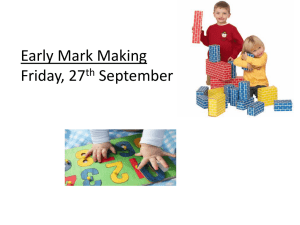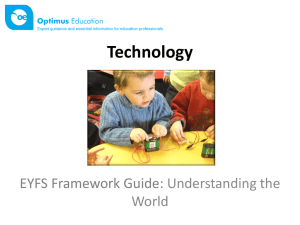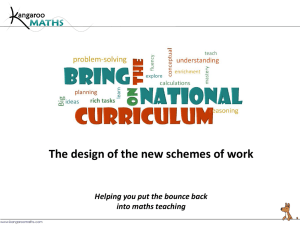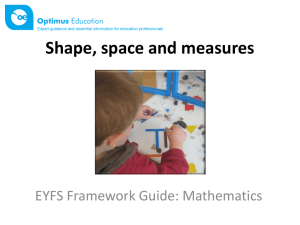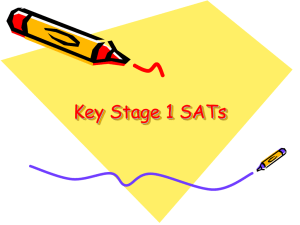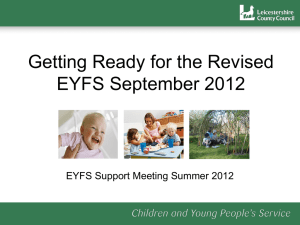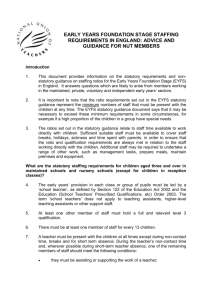Mathematics in the EYFS
advertisement
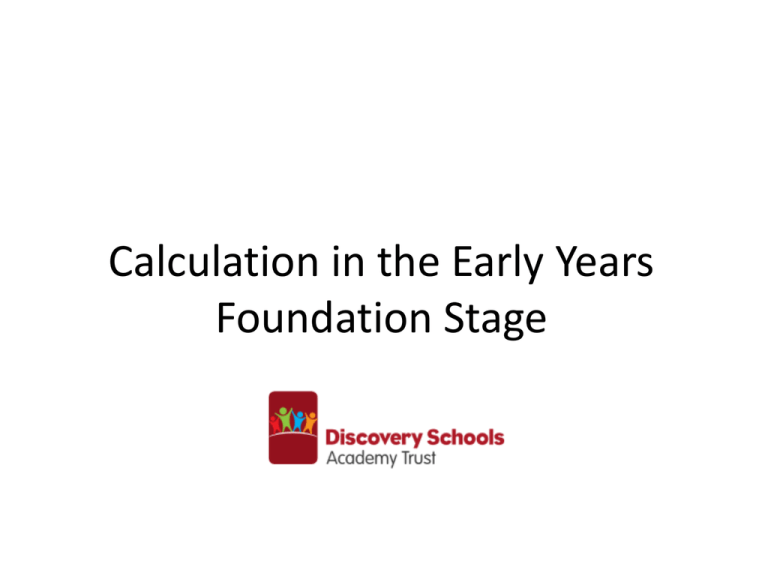
Calculation in the Early Years Foundation Stage Early Maths Research on children’s learning in the first six years of life demonstrates the importance of early experiences in mathematics. An engaging and encouraging climate for children’s early encounters with mathematics develops their confidence in their ability to understand and use mathematics. These positive experiences help children to develop dispositions such as curiosity, imagination, flexibility, inventiveness, and persistence, which contribute to their future success in and out of school (Clements & Conference Working Group, 2004). The NCTM (National Council of Teachers of Mathematics) states “Young learners’ future understanding of mathematics requires an early foundation based on a high-quality, challenging, and accessible mathematics education. Young children in every setting should experience mathematics through effective, research-based curricula and teaching practices. Such practices in turn require that teachers have the support of policies and resources that enable them to succeed in this challenging and important work.” They go on to highlight how early maths can support the aims of the new Curriculum 2014: “Early childhood educators should actively introduce mathematical concepts, methods, and language through a variety of appropriate experiences. Teachers should guide children in seeing connections of ideas within mathematics as well as with other subjects, developing their mathematical knowledge throughout the day and across the curriculum. They must encourage children to communicate, explaining their thinking as they interact with important mathematics in deep and sustained ways.” THE EARLY YEARS FOUNDATION STAGE Mathematics involves providing children with opportunities to develop and improve their skills in counting, understanding and using numbers, calculating simple addition and subtraction problems; and to describe shapes, spaces, and measures. (Statutory Framework for the Early Years Foundation Stage, DfE: 2012) Addition Maths for young children should be meaningful. Where possible, concepts should be taught in the context of real life. Subtraction Maths for young children should be meaningful. Where possible, concepts should be taught in the context of real life. Multiplication Maths for young children should be meaningful. Where possible, concepts should be taught in the context of real life. Division and fractions Maths for young children should be meaningful. Where possible, concepts should be taught in the context of real life. Development Matters in the Early Years Foundation Stage (EYFS) This non-statutory guidance material supports practitioners in implementing the statutory requirements of the EYFS. ©Crown Copyright 2012 Links to calculation: 22 – 36 months Obj Gui 30 – 50 months Obj Gui 40 – 60 months Obj Obj Gui Gui Early Learning Goal for Numbers Obj Gui Ex Gui Creates and experiments with symbols and marks representing ideas of number. Begins to make comparisons between quantities. Uses some language of quantities, such as ‘more’ and ‘a lot’. Knows that a group of things changes in quantity when something is added or taken away. Beginning to represent numbers using fingers, marks on paper or pictures. Compares two groups of objects, saying when they have the same number. Separates a group of three or four objects in different ways, beginning to recognise that the total is still the same. Says the number that is one more than a given number. Finds one more or one less from a group of up to five objects, then ten objects. In practical activities and discussion, beginning to use the vocabulary involved in adding and subtracting. Records, using marks that they can interpret and explain. Children count reliably with numbers from one to 20, place them in order and say which number is one more or one less than a given number. Using quantities and objects, they add and subtract two single-digit numbers and count on or back to find the answer. They solve problems, including doubling, halving and sharing. Development Matters in the Early Years Foundation Stage (EYFS) This non-statutory guidance material supports practitioners in implementing the statutory requirements of the EYFS. ©Crown Copyright 2012 Return Development Matters in the Early Years Foundation Stage (EYFS) This non-statutory guidance material supports practitioners in implementing the statutory requirements of the EYFS. ©Crown Copyright 2012 Return Development Matters in the Early Years Foundation Stage (EYFS) This non-statutory guidance material supports practitioners in implementing the statutory requirements of the EYFS. ©Crown Copyright 2012 Return Additional information for the ‘exceeding’ judgement taken from the 2014 Early Years Foundation Stage Handbook Numbers: Children estimate a number of objects and check quantities by counting up to 20. They solve practical problems that involve combining groups of 2, 5, or 10, or sharing into equal groups. (This descriptor has been amended to reflect the increased level of challenge applied to the expected descriptor following the Tickell review.) © Crown copyright 2013 2014 Early Years Foundation Stage Handbook
